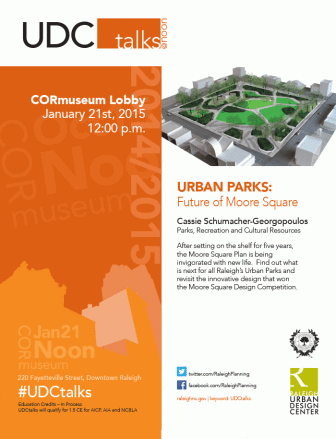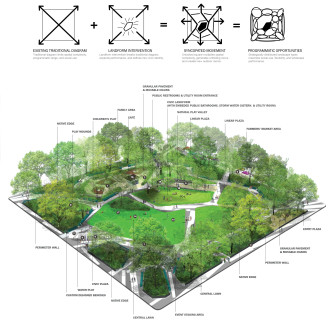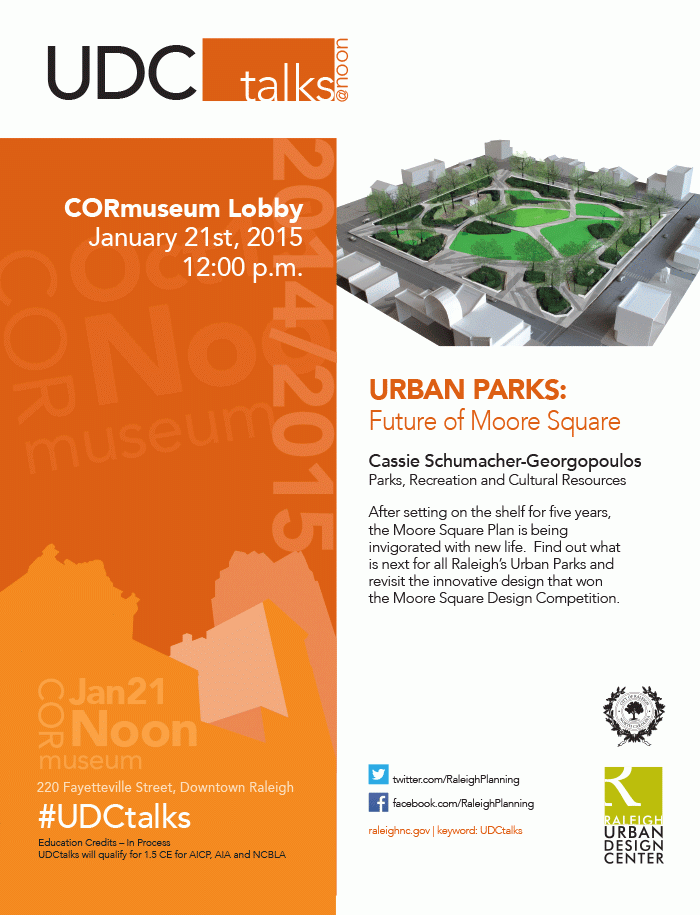The redevelopment of Moore Square has been a project long mired in the planning process, bedeviled by licensing issues, funding delays and mixed public feedback.
 The project’s latest setback was the cancellation in January of a talk hosted by the city’s Urban Design Center on the future of Moore Square.
The project’s latest setback was the cancellation in January of a talk hosted by the city’s Urban Design Center on the future of Moore Square.
A public records request revealed that the event scheduled for January 21 was canceled due to “issues” with the master plan design and the design, which needed to be fixed before getting people “excited about moving forward.”
The goal of the project, according to the 2011 Moore Square Master Plan, is to establish “a forward looking vision for a 21st century urban space.” There will be a “continuous expanse of open lawn” and “a range of diverse landscape types and social activities.” The vision is to have “a variety of grand and impromptu performances, children’s water play, weekend markets, street fairs and festivals.”
Emails obtained by the Record show a project that was moving forward with momentum after engaging in talks with Brad J. Goldberg. Goldberg is a Dallas-based artist who portrays himself to be an idea generator and who has worked collaboratively with artists, civic leaders and communities.
On December 9, 2014, an email sent by Kim Curry-Evans, the public art coordinator for the city of Raleigh, detailed the scope of services and schedule of work required by Goldberg for the project. Goldberg was to be paid $15,000 in increments for an “artwork concept design proposal,” “design team,” and “PADB.”
On December 22, Goldberg sent to Curry-Evans a “marked-up copy” of the contract and the scope of services was updated on December 29. By January 12, documents were being exchanged between Curry-Evans and Goldberg regarding the Certificate of Insurance, which needed to show Goldberg had commercial general liability insurance.
But on January 16, just days before the kickoff event that the city hoped would revitalize public interest in the Moore Square project, Beth Nooe of the Urban Design Center sent an email canceling the event.

Moore Square Master Plan
Nooe wrote to Raleigh’s web content manager Stephanie Currier, “Please pull all media alerts, remove website information and email text about Moore Square design lecture,” and copied five other individuals in her email. She’d write later to say that the scheduled speaker had pulled out at the last minute.
Emails in the following days reveal a communication breakdown between the Parks, Recreation and Cultural Resources department, the Urban Design Center, and Public Affairs. Despite the cancellation, an email announcement toting the upcoming lecture was sent out by the city on January 19.
When those involved with the project saw the announcement, a flurry of emails went out, with everyone trying to figure out why the announcement went out.
It turned out the staff member in charge of the calendar had scheduled the event on Friday to be broadcast on Monday and then went on vacation. In explaining this cancellation to David Diaz of the Downtown Raleigh Alliance, Grant Meacci of the Urban Design Center said the cancellation was due to “’issues’ with the master plan design and design team.”
“People love it or hate it,” Meacci said of the master plan in a phone interview. “There are not many people that are on the fence about it.” He added, “People bring it up again when they have an ax to grind.”
Despite these issues, the city still plans to make an effort to involve the public in its plans for the future of the project. An email sent by Curry-Evans indicated she hoped to get Goldberg slotted in for the week of April 27, which was said to be the new week of public engagement for Moore Square.
